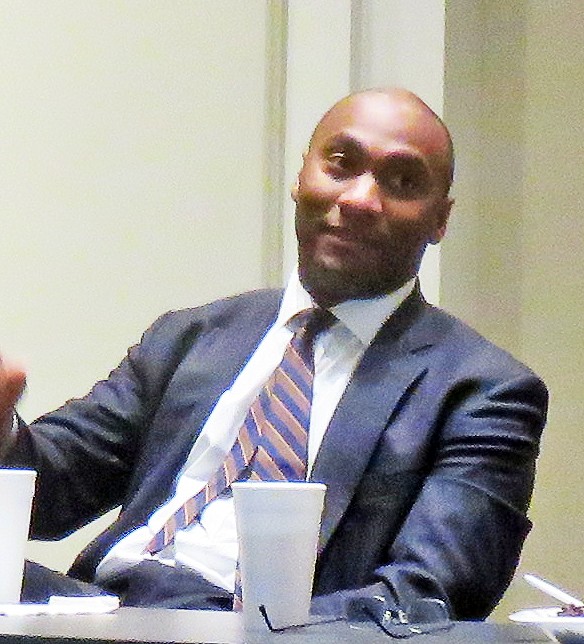 JB
JB
Harris at NFIB meeting
If Senate Minority Leader Lee Harris has his way, Governor Bill Haslam won’t have his way in the forthcoming legislative session on some key matters without at least incurring some serious harassment from the small band of Senate Democrats.
One of the matters Harris intends to challenge Haslam on is the Governor’s announced plan to outsource more state functions than at present and to meanwhile conduct an investigation into that possibility.
In an interview with Memphis television station WATN-TV recorded for broadcast on Sunday, Harris complained about the authenticity of the probe, contending among other things that the “investigation” was not occurring at the state sites — parks, schools, etc. — in question and that the investigation was being led by individuals too close to the governor to be independent .
(Harris did not mention any names in his intrerview, but in a follow-up conversation later he indicated that he had been referencing two employees of KraftCPA, a firm he made a point of praisingf overall but one with too many ties to the Governor to be appropriately involved in the out-sourcing investigation.)
“I don’t know where that investigation is happening,” Harris said, “but so far it is not being conducted at the facilities on the ground.” He questioned the rationale of the investigation: i.e., that further out-sourcing would preserve government operations at their current levels, at the very least.
“If that’s the case, let’s have a real independent investigation. It is not okay to hire a campaign fundraiser to do an investigation. It is not okay to hire an ally. It is not okay to hire somebody who, in a sense works for you as a state appointee….There are plenty of people out there we could hire, and we don’t have to undrmine the credibility of this process by doing what’s been done so far.”
*On a couple of other issues, Harris professed optimism that bipartisan progress could be made.
On decriminalization of marijuana, for example, he foresaw “some open minds in the legislature on both sides of the aisle,” and specified one such as “a new center of power,” Sen. Randy McNally, about to become the state’s lieutenant governor.
McNally, he said, had been “one of the first” to proclaim that possession of small amounts of marijuana should not be a felony. (See also “Medical Marijuana Coming to Tennessee?” )
On another issue of more specific relevance to Memphis, Harris said he and GOP state Senator Brian Kelsey intended to work together “on a bipartisan basis” to conduct public inquiries on the matter of TVA’s intent to drill wells into Memphis’ sand aquifier, source of the city’s drinking water, in order to provide coolant for the Authority’s forthcoming new natural-gas plant, slated to open in 2018.
Noting that environmentalists had raised questions about possible contamination of the water supply from TVA drilling, Harris said, “We have to say that some things are sacred, and our water supply is one of them.”
(The Shelby County Board of Water Quality Control recently okayed the completion of the TVA drilling process in a brief hearing, but the Sierra Club intends to mount an appeal to Chancery Court and will attempt to persuade the Shelby County Commission to tighten rules on permits for new wells, a process currently overseen by the county Health Department with minimal public notification.
In a “roundtable” session conducted by the National Federation of Independent Business in Memphis a day earlier, on Wednesday, Harris had also mentioned the prospect of some undefined joint action with Kelsey on the aquifier issue.
At the NFIB affair, he had also raised doubt that Tennessee stood to acquire block grants for health care under a hypothetical new program that might be authorized by the Republican congress under the Trump administration. “If Obamacare is redone and they institute block grants, we get nothing,” Harris averred, on the theory that only money for Medicaid expansion previously committed to participating states under the Affordable Care Act would be rerouted through block grants.
Since Tennessee had not participated in the Medicaid expension part of the ACA Act, it would be ineligible, Harris argued. (On that point. state Rep. Ron Lollar, another participant in he NFIB forum, differed, saying he believed the U.S. Supreme Court had ruled that no state could be denied its share of Medicaid expansion funds.)